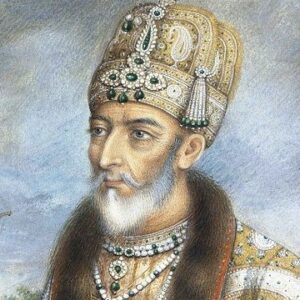Bahadur Shah Zafar, also called Bahadur Shah II, was India’s last Mughal emperor. He ruled for 20 years, from 1837 to 1857. As Akbar Shah II and Lal Bai’s second son, he was not the first choice of his father to take the throne. But after his father died, he ended up taking the throne because of what happened. Even as an emperor, he didn’t have a big empire. His empire didn’t go much farther than the Red Fort in Delhi. At that time, the East India Company was gaining political power in India, and the emperor no longer had any real control over the country, which had already been broken up into hundreds of kingdoms and principalities. He wasn’t a very ambitious leader, so the British didn’t think he was much of a threat. But Zafar did have a big part in the Indian Rebellion of 1857, which was a fight for India to be free from British rule. Zafar is best known for being the last Mughal emperor, but he was also a very talented Urdu poet and musician. He had written a lot of ghazals, and some of the best Urdu writers, like Mirza Ghalib, Dagh, Mumin, and Zauq, lived at his court.
Early years and childhood
He was born on October 24, 1775. He was one of Akbar II’s 14 sons. Lal Bai, his mother, was a Hindu Rajput. His full name was Mirza Abu Zafar Sirajuddin Muhammad Bahadur Shah Zafar.
He learned Urdu, Persian, and Arabic when he was a young boy. As a prince, he was also trained in horsemanship, swordsmanship, shooting with a bow and arrow, and shooting with guns.
Two of his teachers, Ibrahim Zauq and Asad Ullah Khan Ghalib, taught him to love poetry. From the time he was a child, he wasn’t very ambitious. He was more interested in Sufism, music, and literature than in politics.
Ascension and Rule
After his father died on September 28, 1837, he took over as the 17th Mughal emperor. In fact, his father had not picked him to take over after him. Akbar II wanted Mirza Jahangir, the son of his wife Mumtaz Begum, to be his successor, but he couldn’t do that because Mirza Jahangir was in a lot of trouble with the British.
Zafar was not a very ambitious person, and even after he became emperor, he did not use his power very much. The British, who were now getting a lot of political power in India, didn’t think he was a threat.
His empire didn’t go much farther than Delhi’s Red Fort. He only had control over a small area of land, but he could collect some taxes and keep a small army in Delhi.
As an emperor, he did his best to make sure that people of all religions were treated equally. He thought that all religions were equal and that it was his job to protect the religious rights of both Hindus and Muslims.
During his rule, he made sure that the court celebrated the most important Hindu holidays, like Holi and Diwali. He cared a lot about how Hindus felt about their religion and didn’t agree with the extreme views of some Orthodox Muslim sheiks.
He was a poet and a dervish. He was also a devout Sufi. He was a well-known Urdu poet who wrote ghazals that were known for how emotional and intense they were. He wrote a lot, and even though a lot of his poetry collections were destroyed in the Indian Rebellion of 1857, the rest of his poems were later put together into Kulliyyat-i-Zafar.
As the Indian revolt against the British grew in 1857, Sepoy regiments took over Delhi. Indian kings who were fighting against the British thought that Zafar would be the best choice to be the Emperor of India. Under his rule, the smaller kingdoms would work together to fight against the British.
He told everyone that he supported the rebellion, and he even made his son Mirza Mughal the leader of his forces. Mirza Mughal didn’t have much experience, so he couldn’t lead the army well. The army and the government of the city were both in a mess.
When it became clear that the British would win, Bahadur Shah ran away to the tomb of Humanyun on the edge of Delhi. But on September 20, 1857, British officials led by Major William Hodson found where he was hiding and made him give up.
The British killed a lot of the men in Zafar’s family, including his sons Mirza Mughal and Mirza Khizr Sultan. Those who lived, like Bahadur Shah, were imprisoned or sent away.
In 1858, Bahadur Shah Zafar, his wife Zeenat Mahal, and some of their other family members were sent to Rangoon, Burma.
Personal History and Legacies
He had four wives, Begum Ashraf Mahal, Begum Akhtar Mahal, Begum Zeenat Mahal, and Begum Taj Mahal. Zeenat Mahal was the closest to him of all his wives. From his wives and concubines, he had many sons and daughters.
After he gave up to the British forces, he was sent to Rangoon, Burma, to live in prison. He left the country with his wife, Zeenat Mahal. He was 87 years old when he died on November 7, 1862.
Estimated Net worth
Unknown.


